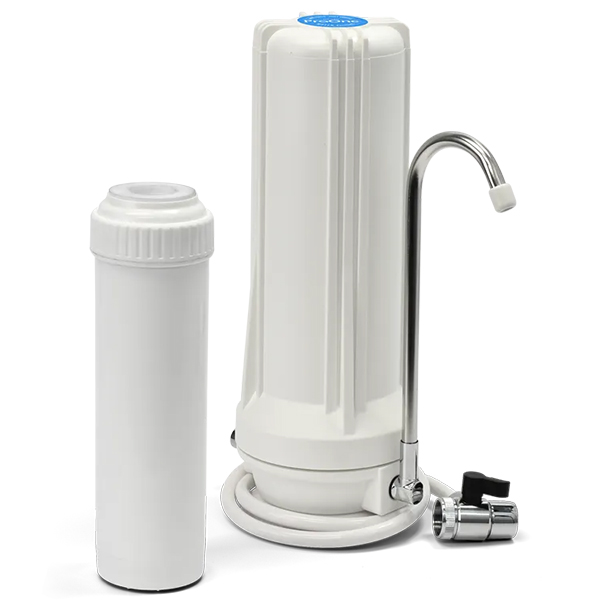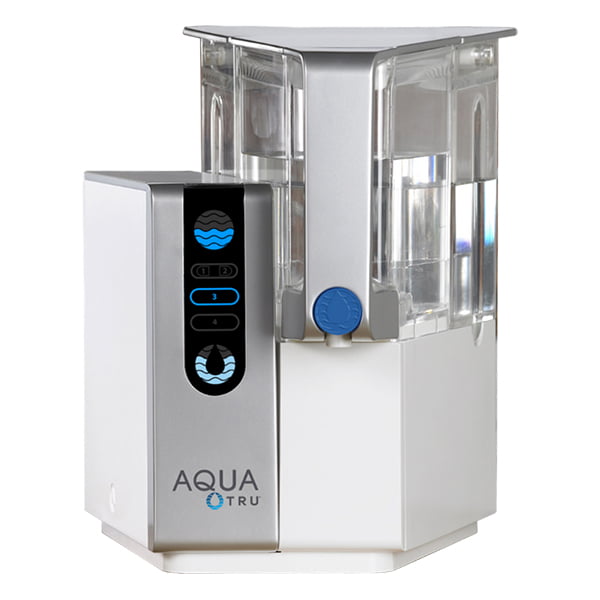Review: ProOne ProMax PMC-3000 Countertop Water Filter (Former Propur)
Written by: Gene Fitzgerald // Expert Fact-Checking: Buddhini Dolapihilla, MBSS // Last Updated: Mar 5, 2024
This page may contain affiliate links. If you buy a product or service through such a link we earn a commission at no extra cost to you. Learn more.
This review explores the ProOne ProMax Countertop Water Filter with the model number PMC-3000. The system has been rigorously tested against NSF standards for removing more than 200 contaminants. Good news? Yeah, but let’s give you all the details before you conclude.
ProOne ProMax PMC-3000 Countertop Water Filter – All Specs
- Model: PMC-3000
- Last Price: $198.95
- Annual Maintenance Cost: ~$85
- Filter Media/Process: Ceramic Outer Shell, Carbon Block Core
- Filter Stages: Multi-Stage
- Flow Rate: 0.2-1.0 gpm
- Filtering Capacity: 900-2,600 gal or 1 Year
- WxHxD: 4.5″x13″x4.5″
- Weight: 5 lb.
- Water Temperature: 41-100 °F
- Water Pressure: 10-75 (125) psi
- NSF Testing: 42, 53
- Warranty: 2 Years (Limited)
ProOne ProMax PMC-3000 – Key Features
We’ll start with the filtration process; we have a unique one here, because the ProOne ProMax PMC-3000 uses different foam layers stacked on top of each other. The company describes it as “layers of unique infused microporous foam technology” that each removes a particular set of contaminants. Each layer contains microstructure media suffused with granulated activated carbon and a custom proprietary formula. As such, there are no resins or beads.
How much can we trust in the filtration process? Quite much. It has been independently tested by a lab against two NSF/ANSI standards — 42 and 53. We counted 220 contaminants with reduction rates! Here’s an excerpt from the lab report (full list further below):
- VOCs – 99.9%
- Heavy metals like lead (99.4%), arsenic 3+5 (98.0%), mercury (91.5%), chromium 3+6 (98.3%)
- Pesticides and herbicides – 95.2-99.9%
- Semivolatile contaminants – 99.8%
- Nitrates – 61.3%
- Nitrites – 72.4%
- Chlorine – 95.5%
- Chloramines – 96.7%
- Sodium fluoride – 90%
- TDS – 86.7%
- Turbidity – 92.5%
- PFOA – 99%
- PFOS – 99%
- Trace pharmaceuticals and other chemicals – up to 99.5%
This system’s testing is obviously very thorough — one of the most extensive we’ve ever seen for a countertop water filter. If only it had official NSF certifications, things would have been perfect. But with no certifications, we have to rely on the performance data being accurate. And if these results are indeed accurate, then the ProOne ProMax Countertop Water Filter (PMC-3000) is highly effective.
What about filter lifespan? Between 900 and 2,600 gallons or one year (wide range? We’ll explain later!). Yearly replacement costs about $85, which is fair. The system also offers an optional upgrade for two filter cartridges in a row, a free wrench, and a two-year system warranty.
ProOne Countertop Water Filter Pros
What benefits make the ProOne ProMax Countertop Water Filter outstanding?
Again, its thorough testing shows high effectiveness, and that means you can rest assured of clean drinking water.
Then, it features a simple installation process. As with similar countertop filters, you don’t need tools, and the process takes only a few minutes. The system suits regular taps with detachable aerators, and the company provides one standard faucet adapter and an optional universal adapter for installation.
Now, this system is not only easy to install but also simple to use. All it takes is to open your faucet and diverter valve. The diverter valve lets you choose whether you want filtered or direct faucet water. Changing the filter elements when they are due is quite as easy as installing them (no stress).
Lastly, this system uses safe design materials that won’t leach BPA or BPS into your water.
What Contaminants Are Being Removed?
The ProOne ProMax Countertop Water Filter (PMC-3000) removes:
- Several dozen VOCs – 99.9%
- 4 THMs – 99.9%
- Heavy metals like aluminum (99.7%), lead (99.4%), arsenic 3+5 (98.0%), nickel (99.0%), cadmium (96.7%), mercury (91.5%), chromium 3+6 (98.3%), copper (99.8%), and iron (98.8%)
- Over 40 pesticides – 95.2-99.9%
- 14 herbicides – 99.9%
- More than 50 semivolatile contaminants – 99.8%
- Nitrates – 61.3%
- Nitrites – 72.4%
- Chlorine – 95.5%
- Perchlorate – 90%
- Cyanide – 99.9%
- Sulfate – 62.5%
- Chloramines – 96.7%
- Sodium fluoride – 90%
- TDS – 86.7%
- Turbidity – 92.5%
- Fluorosilic Acid – 90%
- Hexafluorosilicate – 90%
- PFOA – 99%
- PFOS – 99%
- Trace pharmaceuticals and other chemicals like Acetaminofen (99.5%), Progestrone (99.5%), Ibuprofen (99.5%), BPA (99.5%), and Naproxen Sodium (99.5%).
The ProOne ProMax PMC-3000 – learn more on Prooneusa.com
Installation
What do we have here? An easy and quick-to-install countertop water filter. The whole process takes only minutes, and you get most of what you need with the system package, including a faucet adapter.
You may need to use these other tools:
- Philips screwdriver
- Protective eyewear
- Teflon tape
- Adjustable wrench
Now, let’s get straight to how to install:
- Take out the aerator from your existing tap.
- Check if you need to use the adapter.
- Connect the diverter valve to the tap.
- Hold the unit upside-down over the kitchen sink.
- Open the cold water just a bit.
- Use the diverter valve to fill the filter.
- Once water begins to flow out the spout, place the system on your countertop and allow water to run 5 minutes (about 2 gallons).
The Package (Parts)
- Filter Housing
- Diverter Valve
- Hose
- Filter Cartridge
- Housing Wrench
- Standard Faucet Adapter
- Outlet Spout
- Selector
Maintenance
You should replace the filters every year or after filtering 900-2,600 gallons. That’ll cost about $85 per year. Replacing the filters is a walk in the park, and we’ve explained it below:
- Turn off the cold water supply and diverter valve.
- Turn the unit upside over the sink.
- Use a wrench to loosen the housing.
- Gently tug the filter away from the base to get it off.
- Insert the part of the new filter element with a hole into the filter base.
- Tighten the housing with the housing wrench and check for leaks.
- Prime the new filter.
ProOne also recommends to occasionally scrub and rinse the filter element.
Manual
Here is a link to the official manual:
https://prooneusa.com/wp-content/uploads/2022/05/counter-under.pdf
NSF and Other Certifications
This system has no NSF certifications, only testing against NSF Standard 42 and 53.
Earlier Product Versions
There’s an earlier version, but it’s basically the same product. We didn’t notice any difference.
Cons
There’s quite a lot on the flip side.
- First, there are no NSF certifications, so we have to rely on the test data being accurate. Now, there’s an issue there. They say the system’s flow rate is 0.2 to 1.0 gpm, which is quite a wide range. And it makes us wonder, at what rate exactly did they test the system for contaminant reduction? If they tested it at 0.2 gpm but you’re using it at 1 gpm, then you can’t have the same reduction rates as what we listed earlier. The system will be less effective for you, and that will make the test data inaccurate.
- Another issue with the flow rate is that it’s pretty low. We can still manage 1 gpm but 0.2 gpm? That’s just unacceptable, and we don’t see how you can use a filter that releases water that slowly.
- Then, we found some contradicting information that’ll leave anyone confused. The website says the filter lasts up to 900 gallons or one year, while the manual says 2,600 gallons. We don’t quite get it. The filtration process, too. Somewhere, it says the system uses different layers of foam media, and elsewhere, it says it uses ceramic outer shell with a carbon block core. Anyway, we’re going with the former option because the second is likely for ProOne gravity water filters. We would have appreciated some clarity, though.
- Also, the system feels a bit expensive. And you can’t use pull-down or designer faucets with it; only regular faucets fit.
- A few users had hiccups when changing the filters. We also found complaints about lousy tasting water and weird smell, although this seems peculiar to just a few users.
ProOne ProMax PMC-3000 Review: Our Verdict + Best for
In summary, the ProMax PMC-3000 Countertop Water Filter by ProOne has been rigorously tested against NSF 42 and 53 for so many contaminants, and the reduction rates are impressive. Its installation and maintenance are quite easy, and it doesn’t cost much to maintain.
However, there are no actual NSF certifications, we don’t know which flow rate they used when testing the system, and it seems pretty expensive. In our opinion, it’s worth four stars!
Our Rating in Detail:
- Filtration Performance: 4.0/5.0
- Filter Capacity (Life): 5.0/5.0
- Purchase Price: 3.5/5.0
- Annual Cost: 4.5/5.0
- Overall: 4.0/5.0
Comparison to Other Countertop Water Filters
Let’s compare this system to the AquaTru, another thoroughly tested countertop water filter.
The AquaTru is a reverse osmosis system, so it’s different from regular countertop water filters like the ProOne. RO systems filter water more thoroughly, but they also have their cons, like wastewater. However, the AquaTru uses an internal pump, so it offers the good in both worlds — very thorough filtration and only 20% wastewater. Regular RO systems waste three to five gallons for every gallon of filtered water, so this is really good.
That’s one reason why the AquaTru is our favorite RO system, and there’s more. As a countertop filter, it saves space and does not need installation; great if you don’t like stress like us. But more importantly, this system’s four filter stages have been thoroughly and independently tested and certified against NSF standards covering about 80 contaminants. Notice that it’s not just tested but also certified — so you can trust its results! The system has five NSF/ANSI certifications, NSF 42, 53, 58, 401, and P473.
That’s not only outstanding but also serves as an assurance of clean water and good health. This system is sure to remove:
- Chlorine – 96.6%
- Cyst – 99.99%
- Chromium 6 – 97.2%
- TDS – 87.1%
- Lead – 99.1%
- Radium 226/228 – 96.4%
- BPA – 99%
- Fluoride – 93.5%
- Several trace pharmaceuticals and pesticides – 86.7%-96.6%
- VOCs – 95% to over 99%
- PFOA, PFOS – 97.5%
Aside from these, the AquaTru is also very easy to use. Even if it’s your first time using a water filter, you won’t have trouble navigating the system. You can set it up within ten minutes, and it filters water very fast. The system is durable and safe, using only BPS and BPA-free Tritan plastic.
On the downside, the AquaTru doesn’t come cheap. It’s costlier to buy and maintain compared to the ProOne. And we learned that some units went bad after a few months. Some users also experienced leaking because of design flaws.
What’s the bottom line? If you don’t mind using an RO system as a countertop water filter, then the AquaTru is your best bet. The ProOne PMC-3000 is also a good choice, but remember, it lacks NSF certifications.
This completes our review of the ProOne ProMax PMC-3000 Countertop Water Filter. If you have any questions please don’t hesitate to leave a comment below!
Information provided on BOS is for educational purposes only. The products and services we review may not be right for your individual circumstances.
We adhere to strict editorial guidelines. Rest assured, the opinions expressed have not been provided, reviewed, or otherwise endorsed by our partners – they are unbiased, independent, and the author’s alone. Our licensed experts fact-check all content for accuracy. It is accurate as of the date posted and to the best of our knowledge.



